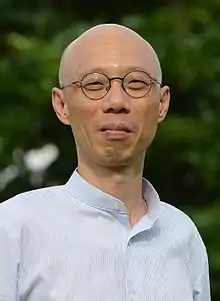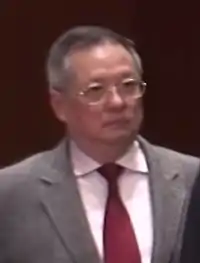Executive Council of Hong Kong
The Executive Council of Hong Kong (ExCo) is the cabinet of the Government of Hong Kong, acting as a formal body of advisers to the Chief Executive of Hong Kong that serves as a core policy-making organ assisting the Chief Executive.[1][2] It is analogous to other Executive Councils in the Commonwealth such as the Federal Executive Council of Australia, the Executive Council of New Zealand, and the Privy Council of the United Kingdom.
 |
|
Politics and government of Hong Kong |
|
Related topics |
| Executive Council of Hong Kong | |||||||||||||
|---|---|---|---|---|---|---|---|---|---|---|---|---|---|
| Traditional Chinese | 行政會議 | ||||||||||||
| Simplified Chinese | 行政会议 | ||||||||||||
| |||||||||||||
| Pre-handover name | |||||||||||||
| Chinese | 行政局 | ||||||||||||
| |||||||||||||
The Executive Council is to "advise" the Chief Executive in policy-making and the administration of the government. The Chief Executive acting after consultation with the Executive Council is known as Chief Executive in Council.[3] The Chief Executive in Council introduces bills to the Legislative Council and issue instruments known as Orders in Council, which amongst other things are used to make delegated legislation, and regulate certain public institutions. The Chief Executive in Council also hears appeals and objections under certain Ordinances.[4]
Under the presidency of the Chief Executive, the Executive Council consists of 16 Official Members (the most senior of these being the Chief Secretary of Hong Kong, head of the Government Secretariat and chair of the Policy Committee), and 16 Non-official Members (also known as ministers without portfolio who are normally leading legislators from pro-establishment political parties) headed by the Convenor of the Non-official Members. The Council normally meets once a week. Unlike the British and Canadian Councils, legislators from the opposition are not appointed to the Executive Council.
History
The Executive Council was set up by the British Hong Kong Government. The first ex officio members were the Colonial Secretary and the Colonial Treasurer in the 1840s. The Attorney General was added in the 1850s. In 1949, the Executive Council had five ex officio members: the senior military officer (Commander of British Forces Overseas), the colonial secretary, the attorney general, the secretary for Chinese affairs and the financial secretary; the Commissioner of Labour, while an 'official' was not an ex officio member. In addition, there were six 'unofficial members': the chief manager of the Hongkong and Shanghai Banking Corporation, the Tai-Pan of Jardine's, a solicitor, two barristers, and a physician.[5]
In 1994 the title 'Senior Member' or 'Senior Unofficial Member' was changed to 'Convenor', when Lydia Dunn was succeeded in the post by Rosanna Wong.[6]
The format of the Executive Council was retained after the transfer of sovereignty in 1997 until a ministerial system (named Principal Officials Accountability System or POAS) was introduced in 2002, Tung Chee Hwa's second term of office. Since then all secretaries are political appointees and have to leave the civil service. All secretaries are appointed to the council, transforming the council effectively into a cabinet. Non-official members are minorities in the council, and are like ministers-without-portfolio. The position of convenor was abolished.
In fulfilling his election platform, Chief Executive Sir Donald Tsang appointed eight new non-official members the day after delivering his first policy address on 12 October 2005. Secretaries of bureaux would sit in meetings of the Council when the agenda was related to their portfolio, and the position of convenor was restored. It was presented as a move to re-strengthen the role of the Council as a link with the community.
Change in composition
| Year | Number of Official Members exclusive of the Chief Executive | Number of Non-official Members |
|---|---|---|
| 1997 | 3 | 11 |
| 2002 | 14 | 5 |
| 2004 | 14 | 7 |
| 2005 | 14 | 15 |
| 2007 | 15 | 16 |
| 2008 | 15 | 15 |
| 2009 | 15 | 16 |
| 2012 | 15 | 14 |
| 2012 | 15 | 16 |
| 2013 | 15 | 14 |
| 2015 | 15 | 15 |
| 2015 | 16 | 14 |
| 2015 | 16 | 16 |
| 2016 | 16 | 16 |
| 2017 | 16 | 15 |
| 2017 | 16 | 16 |
Composition
The members of Executive Council are appointed by the Chief Executive from among principal officials (heads of department, informally called "ministers"), members of Legislative Council, and public figures. Their appointment and removal is decided by the Chief Executive. There is no fixed term of office, but the term of office of members cannot extend beyond the expiry of that of the Chief Executive who appoints them (Article 55 of the Basic Law).
The Council is presided over by the Chief Executive. In addition to the 16 principal officials there are 16 Non-official members. Other than the Chief Secretary, Financial Secretary and Secretary for Justice, official members only sit in meetings that are related to their portfolio.
The following list includes all members of the Executive Council in the order of precedence:
- Note: To avoid confusion, all the names on this list follow the Hong Kong convention (English name <if available>, family name, Chinese given name <if available>) for consistency.
| Capacity | Portrait | Members | Affiliation | Portfolio | Assumed Office | Born In | Ref | |
|---|---|---|---|---|---|---|---|---|
| President | .jpg.webp) |
Carrie Lam | Nonpartisan | Chief Executive | 1 July 2017 | 1957 | [7] | |
| Official |  |
Matthew Cheung | Nonpartisan | Chief Secretary for Administration | 16 January 2017 | 1951 | ||
| Official |  |
Paul Chan | Nonpartisan | Financial Secretary | 16 January 2017 | 1955 | ||
| Official | .jpg.webp) |
Teresa Cheng | Nonpartisan | Secretary for Justice | 6 January 2018 | 1958 | ||
| Non-official | .jpg.webp) |
Bernard Chan | Nonpartisan | Non-official Convenor of the Executive Council | 1 July 2017 | 1965 | ||
| Non-official | .jpg.webp) |
Laura Cha | Nonpartisan | Chairman of the Financial Services Development Council | 19 October 2004 | 1949 | [8] | |
| Non-official |  |
Arthur Li | Nonpartisan | Chairman of the Council of the University of Hong Kong | 1 July 2012 | 1945 | [9] | |
| Non-official | .jpg.webp) |
Chow Chung-kong | Nonpartisan | Chairman of the Hong Kong Exchanges and Clearing | 1 July 2012 | 1950 | [10] | |
| Non-official | _(cropped).jpg.webp) |
Fanny Law | Nonpartisan | Chairman of the Board of Directors of the Hong Kong Science and Technology Parks | 1 July 2012 | 1953 | [11] | |
| Official |  |
Wong Kam-sing | Nonpartisan | Secretary for the Environment | 1 July 2012 | 1963 | [12] | |
| Non-official |  |
Jeffrey Lam | BPA | Member of Legislative Council Vice-Chairman of BPA |
17 October 2012 | 1951 | ||
| Non-official | .jpg.webp) |
Ip Kwok-him | DAB | Hong Kong Deputy to the National People's Congress Former Vice-Chairman of DAB |
17 March 2016 | 1951 | ||
| Non-official |  |
Tommy Cheung | Liberal | Member of Legislative Council Chairman of Liberal Party |
25 November 2016 | 1949 | ||
| Non-official | .jpg.webp) |
Martin Liao | Nonpartisan | Member of Legislative Council | 25 November 2016 | 1957 | ||
| Non-official |  |
Joseph Yam | Nonpartisan | Executive Vice President of the China Society for Finance and Banking | 1 July 2017 | 1948 | ||
| Non-official |  |
Regina Ip | NPP | Member of Legislative Council Chairperson of New People's Party |
1 July 2017 | 1950 | ||
| Non-official |  |
Ronny Tong | Path of Democracy | Senior Counsel Convenor of Path of Democracy |
1 July 2017 | 1950 | ||
| Non-official |  |
Wong Kwok-kin | FTU | Member of Legislative Council Former Chairman of FTU |
1 July 2017 | 1952 | ||
| Official | .jpg.webp) |
Law Chi-kwong | Nonpartisan | Secretary for Labour and Welfare | 1 July 2017 | 1957 | ||
| Official | .jpg.webp) |
John Lee | Nonpartisan | Secretary for Security | 1 July 2017 | 1957 | ||
| Official |  |
Frank Chan | Nonpartisan | Secretary for Transport and Housing | 1 July 2017 | 1958 | ||
| Official |  |
Sophia Chan | Nonpartisan | Secretary for Food and Health | 1 July 2017 | 1958 | ||
| Official |  |
Edward Yau | Nonpartisan | Secretary for Commerce and Economic Development | 1 July 2017 | 1960 | ||
| Non-official |  |
Lam Ching-choi | Nonpartisan | Chairman of the Elderly Commission | 1 July 2017 | 1960 | ||
| Official |  |
Michael Wong | Nonpartisan | Secretary for Development | 1 July 2017 | 1962 | ||
| Official |  |
Kevin Yeung | Nonpartisan | Secretary for Education | 1 July 2017 | 1963 | ||
| Non-official |  |
Kenneth Lau | BPA | Member of Legislative Council Chairman of Heung Yee Kuk |
1 July 2017 | 1966 | ||
| Non-official |  |
Horace Cheung | DAB | Member of Legislative Council Vice-Chairman of DAB |
1 July 2017 | 1974 | ||
| Official | .jpg.webp) |
Patrick Nip | Nonpartisan | Secretary for the Civil Service | 20 April 2020 | 1964 | ||
| Official |  |
Erick Tsang | Nonpartisan | Secretary for Constitutional and Mainland Affairs | 20 April 2020 | 1963 | ||
| Official |  |
Alfred Sit | Nonpartisan | Secretary for Innovation and Technology | 20 April 2020 | 1962 | ||
| Official |  |
Caspar Tsui | DAB | Secretary for Home Affairs | 20 April 2020 | 1976 | ||
| Official |  |
Christopher Hui | DAB | Secretary for Financial Services and the Treasury | 20 April 2020 | 1977 | ||
Source[13]
List of the past Executive Councils
- 1896–1941: List of Executive Council of Hong Kong unofficial members 1896–1941
- 1946–1997: List of Executive Council of Hong Kong unofficial members 1946–1997
- 1997–2002: First term of Tung Chee-hwa as Chief Executive of Hong Kong
- 2002–2005: Second term of Tung Chee-hwa as Chief Executive of Hong Kong
- 2005–2007: First term of Donald Tsang as Chief Executive of Hong Kong
- 2007–2012: Second term of Donald Tsang as Chief Executive of Hong Kong
- 2012–2017: CY Leung as Chief Executive of Hong Kong
- 2017–present: Carrie Lam as Chief Executive of Hong Kong
Location
The Executive Council meets in the Lower Block of the Central Government Complex, Tamar. Until 2012, ExCo met in the Main Wing of the Central Government Offices on Government Hill, in Central and below Government House (former residence of the British Governor of Hong Kong).
Prior to the Handover, the Provisional Executive Council of Hong Kong, headed by Tung Chee Hwa, met in Shenzhen or Tung's office on the 11th floor of the Asia Pacific Finance Tower in Hong Kong. Members of the outgoing British Hong Kong ExCo were not permitted to attend this body.
Both Executive Council sittings were on Tuesdays.
See also
References
- "Hong Kong – the Facts". GovHK.
- Article 54, Hong Kong Basic Law: The Executive Council of the Hong Kong Special Administrative Region shall be an organ for assisting the Chief Executive in policy-making.
- Section 3, Interpretation and General Clauses Ordinance (Cap. 1).
- Section 64, Interpretation and General Clauses Ordinance (Cap. 1).
- Ingrams, Harold, Hong Kong (Her Majesty's Stationery Office, London: 1952), p. 231.
- Hong Kong's Journey to Reunification - Memoirs of Sze-yuen Chung, p307, Chinese University Press, 2001, ISBN 962-996-002-8
- "Chief Executive – Biography". Government of Hong Kong. Archived from the original on 3 May 2013. Retrieved 2 May 2013.
- "The Honourable Mrs Laura CHA SHIH May-lung, GBS, JP". Executive Council of Hong Kong. Retrieved 2 May 2013.
- "Professor the Honourable Arthur LI Kwok-cheung, GBS, JP". Executive Council of Hong Kong. Retrieved 2 May 2013.
- "The Honourable CHOW Chung-kong". Executive Council of Hong Kong. Retrieved 2 May 2013.
- "The Honourable Mrs Fanny LAW FAN Chiu-fun, GBS, JP". Executive Council of Hong Kong. Retrieved 2 May 2013.
- "Mr Wong Kam-sing, JP, Secretary for the Environment". Government of Hong Kong. Retrieved 2 May 2013.
- ExCo membership announced, 29 June 2012, HK Information Services Department
External links
| Wikimedia Commons has media related to Executive Council of Hong Kong. |
